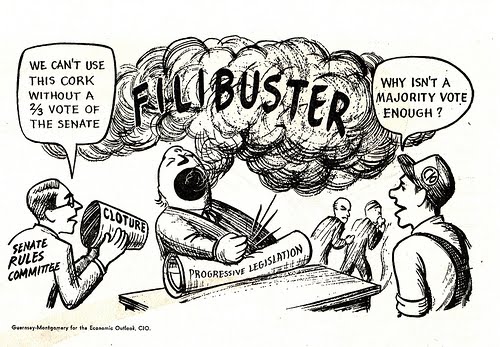|
Moderated by NW Okie! |
Volume 14 , Issue 222012Weekly eZine: (366 subscribers)Subscribe | Unsubscribe Using Desktop... |
History of Filibuster Dates Back To 1850's

According to the United States Senate archives & history, the delay or blocking legislative action using the filibuster has a long history. The term "Filibuster" is from a Dutch word meaning "Pirate." It became popular in the 1850s, when it was applied to efforts to hold the Senate floor in order to prevent a vote on a bill. It seems today the present Congress has moved away from the debating part of the filibuster.
In the 19th century, the early years of congress, representatives and senators could filibuster. Revisions to the House rules limited debate, as the House of Representatives grew in numbers. While in the Senate the unlimited debate continued on the grounds that any senator should have the right to speak as long as necessary on any issue.
It was in 1841, when the Democratic minority hoped to block a bank bill promoted by Kentucky Senator Henry Clay. Clay threatened to change Senate rules to allow the majority to close debate. It was the Missouri Senator Thomas Hart Benton, who rebuked Clay for trying to stifle the Senate's right to unlimited debate.
It was in 1917, Senators adopted Rule 22, at the urging of President Woodrow Wilson. Rule 22 allowed the Senate to end a debate with a 2/3 majority vote, which was known as "Cloture." This senate rule was first put to the test in 1919, when the Senate invoked cloture to end a filibuster against the Treaty of Versailles. With the new cloture rule, filibusters remained an effective means to block legislation, with a 2/3 vote being difficult to obtain.
It was over the next five decades, the Senate occasionally tried to invoke cloture, but usually failed to gain the necessary 2/3 votes. Southern senators found the filibuster particularly useful and sought it out to block civil rights legislation, including anti-lynching legislation, until cloture was invoked after a 57 day filibuster against the Civil Right Act of 1964.
It was in 1975, when the Senate reduced the number of votes required for cloture from 2/3 to 3/5 (60 of the current one hundred senators).
During the 1930's, Senator Huey P. Long frustrated his colleagues while entertaining spectators with his recitations of Shakespeare and his reading of recipes for "pot-likkers." Long effectively used the filibuster against bills that he thought favored the rich over the poor. Long once held the Senate floor for 15 hours. The record for the longest individual speech goes to South Carolina's J. Strom Thurmond, who filibustered for 24 hours and 18 minutes against the Civil Rights Act of 1957.
| View or Add Comments (0 Comments)
| Receive
updates ( subscribers) |
Unsubscribe
| © . Linda Mcgill Wagner - began © 1999 Contact Me | |
